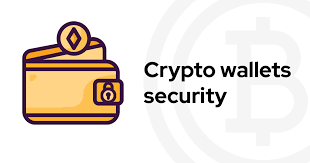In the wild world of crypto, weak passwords are like leaving your gold in the open. Here, I’ll tell you how to create a strong crypto wallet pasword. It’s not rocket science! With a few smart moves, you can craft a password that’ll have hackers scratching their heads. We’ll start with the basics of making it tough, like picking a password length that laughs in the face of cyber-thieves. But we won’t stop there.
I’ll guide you through using nifty tools that whip up ironclad passwords and show you how an extra step like two-factor authentication is like having a guard dog for your digital dough. And because a strong password is just part of the game, I’ll share the smartest ways to keep it under lock and key, like making password changes routine and where to stash them offline. Think that’s strong? Wait until we dive into next-level tricks to keep your crypto snug as a bug. Get ready to bulletproof your digital wallet!
Understanding the Foundations of Password Security for Crypto Wallets
The Role of Password Complexity in Safeguarding Digital Assets
Creating a strong password for your crypto wallet starts with complexity. Think of your password like a lock. The more complex it is, the harder it is for thieves to break in. Complex passwords have big and small letters, numbers, and symbols. Imagine a thief tries a bunch of keys on your lock. The more pins inside the lock (your password’s complexity), the less chance they have the right key.
A good password must be hard to guess. Don’t use easy stuff like “12345” or “password”. Mix it up with letters and symbols tht don’t form a word or phrase. Use different letters and symbols in places no one expects. The goal is to make it tough for hackers. They often try common words and simple patterns first. Make them work for it!
Selecting a Password Length That Defies Hacking Attempts
Longer passwords are safer. This is a big deal when protecting your digital assets. Length beats guesswork. The more characters you have, the more guesses a hacker needs to get it right. Aim for at least 12 characters. Even better, go for 16 or more. Every extra character makes a thief’s job tougher.
Use a mix of capital and lowercase letters, numbers, and symbols. This makes your password even stronger. You might worry about remembering long passwords. But there’s a trick. Use a phrase or a sentence you know well. Swap some letters for numbers and symbols. It’s like a secret code that only you understand.
Always keep your password to yourself. This is serious. Sharing can lead to trouble. If someone asks for your crypto wallet password, they might be trying to steal from you.
Your crypto wallet is like a treasure chest. The password is the key. Keep the key safe, and your treasure stays safe too. Remember, hacking attacks happen all the time. Stay one step ahead with a strong password.
Choose smart and stay safe out there. Your digital wealth depends on it.
How to create a strong crypto wallet pasword by Technical Tools and Techniques
Utilizing Passphrase Generators for Robust Security
Creating a strong password is your first step to protecting your cryptocurrency wallet. A good passphrase generator is like a secret recipe for security. It mixes up letters, numbers, and symbols to make a password super strong. Think of it like your own security smoothie. You want lots of different ingredients so no one can guess the flavor. That means more safety for your digital money.
Passphrase generators help because they create passwords that are hard to guess. They use a mix of upper and lower case letters, numbers, and symbols. It’s like playing dress-up with your password. You want it to wear a disguise that no one can recognize. You’ll get a password that looks nothing like your pet’s name or birthday.
Using a passphrase generator is a smart move. It stops sneaky hackers from taking a peek at your wallet. These generators give you a key that’s unique. It’s like a one-of-a-kind snowflake. No two are the same. You’ll have peace of mind knowing your password is not like anyone else’s.
Remember, your passphrase should stay yours alone. Keep it secret! If you write it down, hide it like a treasure map. Tell no one where X marks the spot.
Implementing Two-Factor Authentication for an Extra Layer of Defense
Now, let’s add armor to your wallet. Two-factor authentication is your knight in shining armor. It asks for two proofs before anyone can touch your coins. It’s like a secret handshake you only share with your wallet.
First, you’ll need something you know, like your passphrase. Then, you need something you have, like a mobile phone or hardware token. This puts two locks on your door. A thief has to be a mind reader and a magician to break in.
Two-factor authentication is a buddy system for safety. You’ve got your password, but you also have a friend checking on you. It’s like needing both a key and a fingerprint to open a safe. It’s tough for hackers to copy that!
Using two-factor authentication, you make sure thieves need more than just luck. They can’t just trip over your password and get in. It’s like they need to win the lottery twice on the same day. Good luck with that!
So, when you’re setting up your wallet, turn on two-factor authentication. It’s a simple click or tap for a whole lot of calm. You’ll breathe easier knowing you’ve doubled down on defense.
By using both passphrase generators and two-factor authentication, you’ve got a superhero team for your wallet. Your digital cash stays nestled safely, out of reach from those cyber crooks. Take these steps and put your mind at ease. Your crypto wallet is not just locked. It’s sealed by your unique, uncrackable secrets.
Best Practices in Managing and Storing Your Wallet Credentials
Let’s get you set up with a safe digital wallet. Creating a strong password for your cryptocurrency wallet can seem hard, but it doesn’t have to be.
The Significance of Regular Password Updates
Regular password changes, a bit like house cleaning, ensure a safe and tidy wallet. If you don’t change your password over time, you might welcome unwanted guests. Remember, your crypto wallet security relies on constant vigilance.
But how often should you change it, you wonder? Think of it like a dental visit, about every six months. Needless to say, more is better, but don’t vex over it.
A good password is like a master key. It opens the door to your treasure pile, your digital assets. To make it hard to guess, mix it up. You don’t want a snooper to stumble upon it. Capital and lowercase letters, symbols in passwords, length of the password–all these factors play a vital role in creating a password strength that resists hacking attempts. A long and complex password is the safest bet.
Use random password generator tools for unique password creation. Think of it as a little helper to keep your wallet safe. These tools use a mix of alphanumeric characters that are hard to crack.
Beware of mnemonic phrases too. You might think it’s clever to use a phrase that means something to you, but it also makes it easier for hackers. Always opt for a random set of words with no personal link.
Offline Password Storage Solutions to Keep Your Crypto Safe
Now let’s talk about storing your credentials. You might be tempted to jot down your password on a piece of paper. However, paper wallets come with their risks. Picture losing your life’s savings due to a small water leak – scary, isn’t it? Instead, consider offline password storage or password storage apps. These can act as your digital safe.

For an extra layer of security, think about a cold wallet or a hardware wallet. Like a home vault, they provide high security with access only when needed. Hardware wallet security is top-notch since it stores your password offline, away from unethical hackers.
Another safe option is to store your password encrypted in a hot wallet, with caution. As hot wallets are linked to the internet, they are vulnerable to hacking. It’s like living in a safe but crowded city; there’s always a risk.
Remember, your cryptocurrency wallet is your digital manor. These password tips are your guards keeping unwanted visitors at bay. Password complexity, regular changes, offline storage – all these measures ensure that your crypto wealth stays yours and continues to grow.
Remember, it all boils down to this: How badly do you want to protect your wallet? Every effort you invest guarantees peace of mind and a good night’s sleep. Now that’s priceless!
Advanced Security Measures to Combat Password Breaching
Embracing Hardware Wallets for Ultimate Protection
Keeping your crypto safe goes beyond picking a tough password. Hardware wallets are your best bet. They keep your crypto safe, even if your computer is hacked. Picture a vault no one can crack. That’s a hardware wallet. It holds your crypto and the keys to access it. You plug it into a computer, type your password, and voila, you get your crypto. But that password? It needs to be solid.
Creating Unique and Unpredictable Passwords: Beyond the Basics
Crypto wallet security is no joke. To avoid hacking, make every password unique. How? Start by using no easy-to-find info, like your birthday. Mix it up with capital and lowercase letters, numbers, and symbols. The more mixed up, the better. This mess of letters and signs will confuse hackers big time.
Think of it like your house. Would you leave your door wide open? Heck no! The same idea applies to creating a strong password. But not just any strong password—one that’s a tough nut to crack. Forget words that make sense. You want something that looks random, like a cat walked on your keyboard. Alphanumeric characters—letters and numbers—are your friends.
Still, a password alone isn’t always enough. Two-factor authentication—that’s your double guard. It checks who you are in two ways. For example: something you know (your password) and something you have (a code from your phone). This is cybersecurity at its finest.
Try a passphrase generator to get a crazy mix of words. That’s a level up from simple password strength. A passphrase is a bunch of random words stuck together. It’s easier to remember and still hard for hackers to guess.
Don’t stop there. Change your password before it gets old news. New password means hackers have to start from scratch. That’s what you want—for them to tip their hat and move along.
Remember, using the same password twice is a no-go. Like eating expired food—just bad news. And when it’s about protecting your digital assets, you play it safe. Always.
For a real fortress, go beyond what’s online. Think paper wallets, writing your password down, and keeping it offline. This is offline password storage. No hacker can touch this. It’s like your hidden treasure map.
Biometrics can add another layer of protection. This could be your fingerprint. It’s something hackers can’t copy because it’s part of you.
So, create that unbreakable password and defend your crypto like a pro. Crazy letters, symbols, and backup plans—these are your keys to peace of mind.
In this post, we dug into how to keep your crypto wallet safe. We covered why a strong, complex password is vital, and how long your password should be to fight off hackers. We also explored how tools like passphrase generators can help, and why two-factor authentication is a key extra step.
We talked about smart ways to handle and store your wallet info, like changing your password often and keeping it offline. Lastly, we looked at top-level security like hardware wallets and making passwords that no one can guess.
Staying safe in the crypto world takes work, but it’s worth it. Use these tips, keep learning, and your digital treasure will stay yours! Stay alert, stay safe, and keep your crypto secure!
Follow Crypto Currency Bitcoin to update more knowledge about Crypto.
Q&A :
1. What makes a password strong for a crypto wallet?
A strong crypto-wallet password needs to be complex and hard to guess. Generally, a combination of uppercase and lowercase letters, numbers, and symbols can help secure your wallet. Remember, it needs to be at least 12 characters long, avoiding common words and personal information.
2. How often should I change my crypto wallet password?
While changing passwords frequently was once considered a best practice, experts now suggest setting a strong, unique password and only changing it if there’s a security incident. Regularly updating your crypto wallet software also ensures you have the latest security patches.
3. Should I use password managers for my crypto wallet?
Password managers can be a good option for storing your crypto wallet password as they generate and store complex passwords for you. However, they aren’t 100% foolproof. You need to ensure you choose a trusted password manager and protect it with a robust master password.
4. Is two-factor authentication helpful for my crypto wallet?
Yes, two-factor authentication adds an extra layer of security. Even if someone guesses or cracks your password, they will not access your crypto wallet without the second verification from your trusted device. Consider implementing it whenever possible.
5. What should I avoid when creating a strong password for my crypto wallet?
Avoid personal information like birthdates, names, or addresses in your password. As a rule, stay away from repetitive or sequential characters or using the same password for multiple wallets or other online accounts. A strong password is random, long, and distinct.
